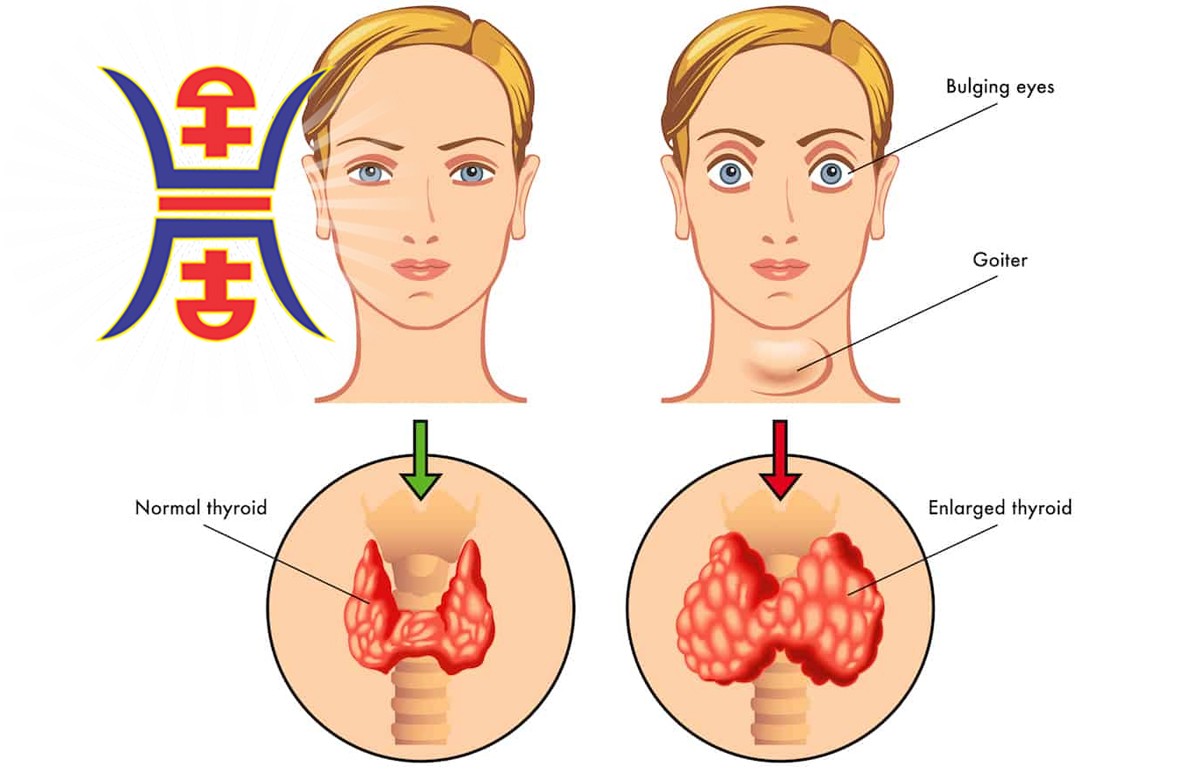Hyperthyroidism
Hyperthyroidism is a medical condition that occurs when the thyroid gland produces too much thyroid hormone. The thyroid gland is a small, butterfly-shaped gland located in the neck, and it produces hormones that regulate the body's metabolism. When the thyroid gland produces too much hormone, it can cause a variety of symptoms and health problems.
Some common symptoms of hyperthyroidism include:
- Weight loss
- Rapid heartbeat
- Increased appetite
- Anxiety and nervousness
- Tremors
- Heat intolerance
- Sweating
- Fatigue
- Muscle weakness
- Insomnia
- Irregular menstrual periods
Hyperthyroidism can be caused by several different factors, including Graves' disease (an autoimmune disorder), thyroiditis (inflammation of the thyroid gland), or a thyroid nodule that produces too much hormone. Treatment options for hyperthyroidism may include medications to block the production of thyroid hormone, radioactive iodine therapy, or surgery to remove part or all of the thyroid gland.
hyperthyroidism treatmentHyperthyroidism in natural health is generally seen as a pattern of disharmony in the body, which can be caused by a variety of factors including emotional stress, improper diet, and chronic illness.
The following are some common causes of hyperthyroidism in natural health:
- Emotional stress: According to natural health theory, emotional stress can lead to an imbalance in the body's energy and cause hyperactivity of the liver, which can in turn affect the thyroid gland.
- Improper diet: Overconsumption of certain types of food, such as greasy or spicy foods, can cause the accumulation of heat and phlegm in the body, leading to hyperthyroidism symptoms.
- Chronic illness: Chronic illnesses such as autoimmune disorders or infections can weaken the body's immune system and lead to the development of hyperthyroidism.
Natural health categorizes hyperthyroidism into different patterns of disharmony based on the presenting symptoms and underlying causes. The following are some common natural health patterns associated with hyperthyroidism:
- Liver Fire attacking the stomach: This pattern is associated with symptoms such as irritability, restlessness, and insomnia. Treatment may focus on clearing heat and soothing the liver.
- Yin deficiency with excess heat: This pattern is associated with symptoms such as night sweats, hot flashes, and dry mouth and throat. Treatment may focus on nourishing yin and clearing heat.
- Kidney Yin deficiency: This pattern is associated with symptoms such as fatigue, weakness, and low back pain. Treatment may focus on nourishing yin and tonifying the kidney.
- Spleen and stomach deficiency: This pattern is associated with symptoms such as poor appetite, loose stools, and fatigue. Treatment may focus on tonifying the spleen and stomach.
- Phlegm fire harassing the heart: This pattern is associated with symptoms such as palpitations, anxiety, and sweating. Treatment may focus on clearing phlegm and regulating the heart.
Natural health treatment for hyperthyroidism may include acupuncture, Chinese herbal medicine, dietary therapy, and lifestyle modifications. The treatment approach will depend on the specific pattern of disharmony that is present. It is important to consult a qualified natural health practitioner for an accurate diagnosis and treatment plan.
In Person With Heshoutang Natural Health Members
With Heshoutang Natural Health Online Members
Fill Out the Questionnaire by yourself
What hyperthyroidism patients need to pay attention to
- Avoid spicy and greasy foods: These foods can contribute to the accumulation of heat and phlegm in the body, exacerbating hyperthyroidism symptoms.
- Increase intake of cooling foods: Foods that are cooling and nourishing, such as cucumbers, watermelon, and mung beans, can help to clear heat and reduce inflammation in the body.
- Eat regular, balanced meals: Eating regular, balanced meals can help to support the spleen and stomach, which are important for the digestion and absorption of nutrients.
- Practice stress reduction techniques: Stress can contribute to the development and exacerbation of hyperthyroidism, so it is important to practice stress reduction techniques such as meditation, yoga, or deep breathing exercises.
- Get adequate rest: Rest is essential for the body to repair and regenerate, and getting adequate sleep can help to support the body's energy and promote healing.
- Avoid smoking and alcohol: Smoking and alcohol can further weaken the body's immune system and exacerbate hyperthyroidism symptoms.
It is important to work with a qualified natural health practitioner to develop an individualized treatment plan that takes into account the unique needs and underlying patterns of disharmony of each individual with hyperthyroidism.
When you subscribe to the blog, we will send you an e-mail when there are new updates on the site so you wouldn't miss them.














Comments